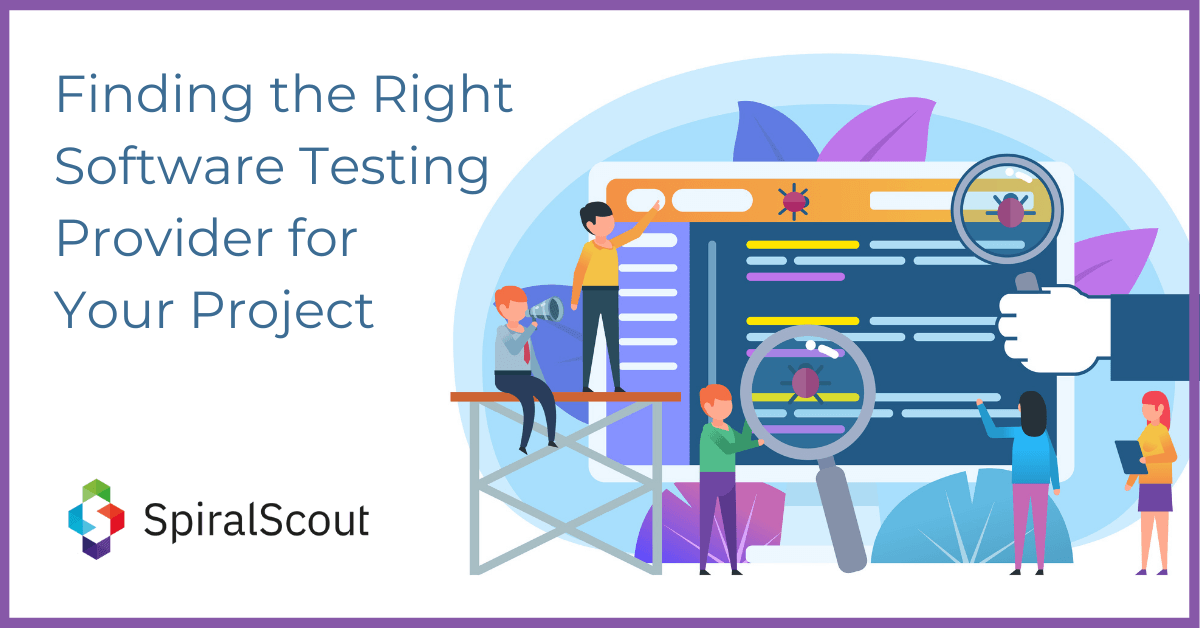
Quality assurance professionals provide software testing services to ensure:
- The user experience of your software is optimized, and that it will be easy and understandable for users to quickly get up to speed to most efficiently use your product
- Your software will operate seamlessly and load quickly as users are engaged in various actions and other relevant activities while using it
- Your software achieves your business goals, and goals of your clients, including solving any problems your customers may have
- Your app will be intuitive and easy to access, i.e., placed on the top of the mobile app stores and, once downloaded, provide a productive and rewarding experience that users turn to again and again
- All integrations of your products with products of your business partners will work seamlessly 100% of the time
- Your product is available and easy to navigate for all users who are working from different countries and regions
- Your product is accessible for people with disabilities or impairments
These are the must-haves that software users demand today. And they have plenty of options to choose from. Ensuring that your software or app performs seamlessly and provides a top-notch user experience isn’t just “nice to do” it’s a “must do.”
In addition to testing your code for bugs, quality assurance experts and software testers will also make suggestions to improve the look, feel, and function of your product, boosting the odds that it will rise to the top of the list when customers are looking for solutions.
Software Testing Service Providers – How Do They Work?
So, what is QA software testing as one of the services in the software development process? Think of it this way: software development is much like building a house. Before you can get to laying a foundation and framing your structure, you work with an architect and contractor to develop designs, plans, and requirements for your dream home. Once the actual building starts, inspectors come in to verify and validate that each new piece meets certain standards and requirements.
In software development, testing and quality assurance professionals serve as those “inspectors.” They can catch faults before they become major problems as well as evaluate the code each step of the way to verify it is meeting the specified requirements. They can also sign off on development phases as your team makes progress toward finalizing the product.
Why Does Software Testing Need to go Hand-in-Hand with development?
Just as in the homebuilding metaphor described earlier, your software testing process mustn’t be treated as an add-on, but instead, as an integral part of the development process. Initiating testing and QA at an early stage in development can help you:
- Save time and money. Quality assurance providers can nip problems in the bud, catching them early on in development so they can be corrected, instead of becoming larger problems down the line that require much broader (and more expensive) fixes.
- Faster development and releases. Testing services in software testing improve feedback, increase visibility of the code and product for developers, and can even enable faster releases, especially when continuous testing is automated.
- Enhance test coverage. Building in adequate time to test a product improves its quality in the long run. When software testers are evaluating a product throughout its development, as opposed to testing only once the product is “finished,” they can more thoroughly validate that the product meets business requirements and adapt as needed to user feedback.
- Increase confidence. Selling your “product,” whether it’s a website, a mobile app, is much easier when you have confidence in the code that supports it. More confidence translates into easier releases, stronger marketing, and a compelling case for adding beneficial features and updates in the future.
- Boost customer satisfaction. The more effectively you can identify and address potential issues that detract from the user experience, the greater satisfaction you’ll achieve with your customers. Better for you to identify possible bugs and opportunities for improvement before customers ever interact with your product.
- Improve marketing communication. The insights you can gain through the quality assurance process can help you identify both potential pain points and benefits that your product minimizes or provides. These can become powerful marketing messages to help position your product and its benefits.
- Identify opportunities for future development. The quality assurance process can provide you with a “wish list” of future development opportunities that may be beyond the scope of this project, but ideal for future releases or entirely new product applications.
Understanding the Types of Software Testing
There is a wide range of software testing options that you might choose from depending on your product and user audience. These different types of testing may influence your choice in quality assurance provider.
- Functional. Functional testing evaluates whether your software meets its original specifications and overall business goals.
- Usability. Usability testing takes a detailed dive into how easy it is for a typical end-user to achieve their goals and perform tasks intuitively.
- Performance. Performance testing looks at how well your software or app operates in handling the demand that might be generated among a high volume of concurrent users or a number of requests.
- Compatibility. Compatibility testing looks at how your software runs on various supported operating systems, devices, and modern browsers. With so much variation in play, it’s crucial that users have confidence in your product regardless of the platform they are using, or the other applications with which it will interact.
- Security. These days, security testing is top of mind for any business and its customers. Security testing looks at potential vulnerabilities and ensures that your product provides the highest level of security for end-users and their businesses.
- Regression. Regression testing ensures that any recent changes in the program or code did not have a negative effect on original behaviors and performance. It’s an important check to make sure that all the steps along the way toward a final deployment maintained the integrity of the product.
- Maintenance. Maintenance testing is done after software has been deployed. It’s a way to verify if the software performs in actual settings as intended, and to identify any needed changes.
- Load. Load testing looks at how your software will perform in an actual user setting under both normal and high demand. What impact will concurrent users have on the software performance? How will the number of connections impact performance?
- Stress. Stress testing looks at the stability of your software under high-use situations to ensure that the system will not crash during heavy use.
These various forms of software testing provide you—and your end-users—with confidence that your software will perform not only as expected during regular demand, but that it can handle heavy demand and unique situations.
Choosing an Outsourced Software Testing Service Provider
Selecting the right software testing services providers for your needs is critical not just for ensuring that your product will work as intended, but for helping you to identify and build in added features and functionality that boost the user experience.
A wide range of project aspects will influence your search for a partner with the best quality assurance and testing services. Keep these particular items in mind, including:
- Budget. While budget will undoubtedly be a consideration in choosing a quality assurance partner, it should not be the single determining factor. You will want to weigh costs in relation to the value the provider will be able to offer.
- Time and scope. Like budget, the timing and scope of the project and functionality the partner can provide will be an important consideration.
- Product life cycle. Here you will evaluate all the steps involved in getting you to a final product.
- Localization needs. When your software or app has users in various global locations, ensuring that you speak their language—not just from a translation perspective, but from a user-experience and consistency standpoint, is critical. When selecting a vendor, you need the assurance that content—including images—will translate well, and naturally, for all potential users.
- Project management. Your interactions with the vendor you select are critical for moving the project along and achieving your desired result on time. Having an assigned project manager to serve as a central point person for facilitating communications will go a long way in keeping everyone updated and on track.
- Change management. Projects rarely move forward without the need for some changes along the way. When you require changes, how will that process work? How will it impact the overall development plan?
- Intellectual property protection. Your software and its code represent valuable intellectual property. Make sure to consider how that property will be protected carefully.
- Workday overlap. Software testing thrives in a global market, which is great—you’ll want to select the best providers available, regardless of their location. But, you’ll also want to make sure to implement good communication practices, which typically requires some overlap in your workdays.
- Security protocols. Security will be top-of-mind for your customers, and it should be for you as well. Make sure you understand and are very comfortable with the knowledge and security protocols that your selected vendor can offer.
Conclusion: The Future of Software Testing
Software testing services in the US and around the world are in higher demand than ever. As technology rapidly evolves and becomes increasingly complex to encompass machine learning and artificial intelligence, and as cybersecurity concerns remain top-of-mind, the need for comprehensive software testing will only continue to grow.
When you’re developing a software solution or app, you want to make sure that you can offer your audience the highest level of user experience and security available. The more you can do to minimize bugs, breakdowns, slow performance, and security breaches, the more likely you are to lead the pack in this considerably crowded market. Following the tips above to ensure that you’re testing for the functionality and performance your audience demands, and doing your due diligence when selecting a software testing vendor, can help you stand out and stand the test of time.



